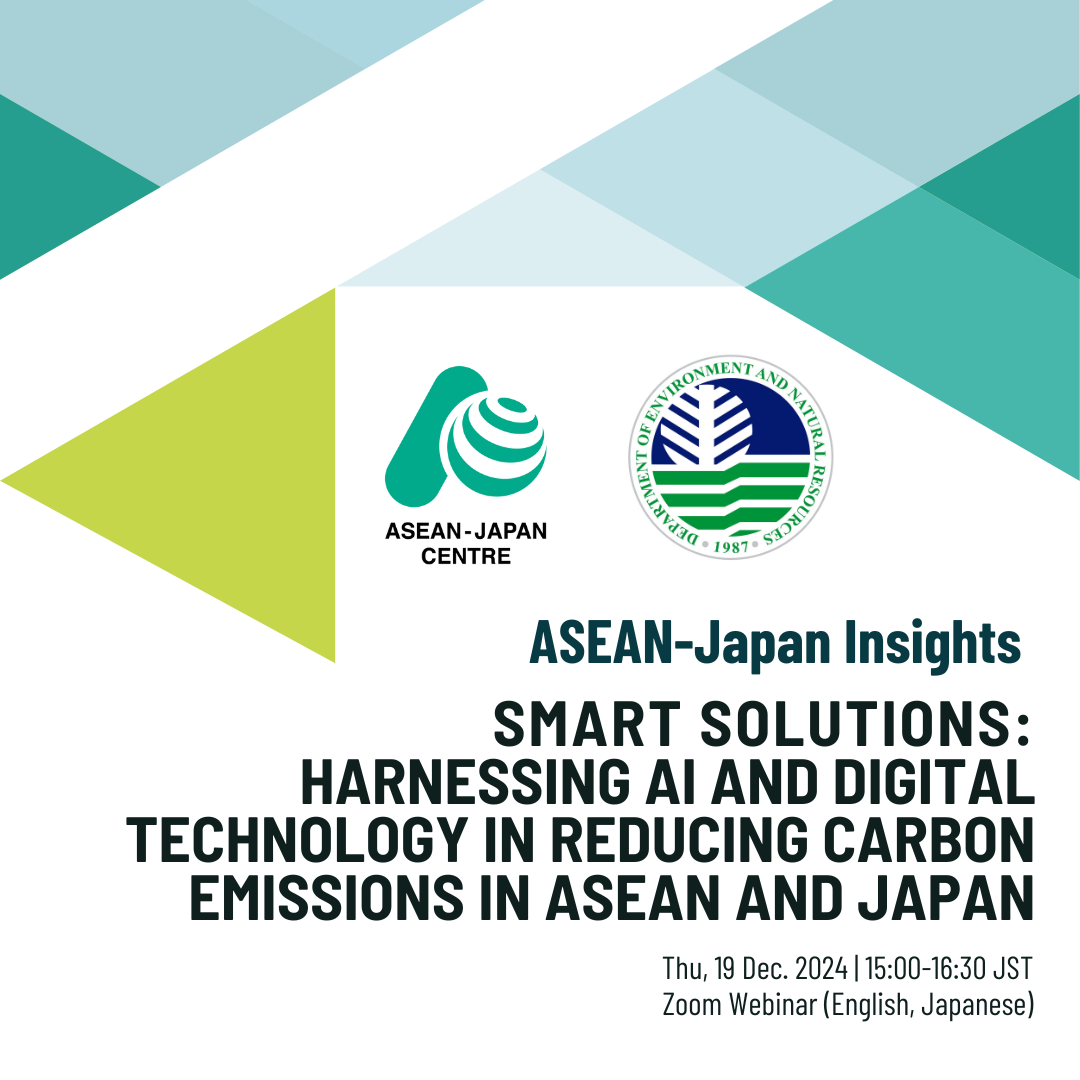The full recording of the webinar is available on YouTube.
Overview:
On 19 December 2024, the ASEAN-Japan Centre, in collaboration with the Knowledge and Information Systems Service (KISS) division of the Department of Environment and Natural Resources (DENR), hosted the “Smart Solutions: Harnessing AI and Digital Technology in Reducing Carbon Emissions in ASEAN and Japan” webinar. The event, part of the ASEAN-Japan Insights Series, brought together experts and stakeholders from across ASEAN and Japan to explore innovative solutions in the fight against carbon emissions.
ASEAN-Japan Centre Secretary General Kunihiko Hirabayashi delivered his welcome remarks, emphasizing on the global challenges posed by climate change. Furthermore, the Secretary General highlighted the importance of collaboration for a sustainable future, one that can be achieved through the path of green and blue growth.
This was followed by the opening remarks from DENR Undersecretary for Finance, Information Systems and Climate Change, Atty. Analiza Rebuelto-Teh. She cited the vulnerability of the ASEAN region to climate change, and that important innovation and smart solutions through AI and digital technologies can enable data-driven decisions to empower stakeholders amidst the call to climate resilience.
The following speakers presented on the following topics:
- Ishitsubo Hiroya, CFO of Sagri Co., Ltd, presented on the use and benefits of satellite data and AI to monitor farmlands, contributing to decarbonization in agriculture.
*Link to presentation - Alex Hong, Director of Aeir, discussed the potential, challenges, and solutions of adopting AI and digital technologies to achieve sustainability goals in the ASEAN region.
*Link to presentation
A lively panel discussion featuring the two speakers and moderated by Arlene A. Romasanta, Director of the Knowledge and Information Systems Service (KISS) division at DENR, soon followed focusing on the challenges and opportunities of leveraging technology to address CO2 emissions across ASEAN.
The key takeaways from presentations are the following:
- Decarbonisation in agriculture: The satellite and AI technology to monitor farmlands can be leveraged to decarbonise agriculture, which contributes to 2% of global emissions. The projects focus on carbon credit generation through water management and soil regeneration, such as a cornerstone collaboration in Viet Nam that feature partnerships with local agricultural companies.
- Carbon Insetting: The activity promotes the implementation of carbon insetting in agriculture. Carbon insetting is a business model where companies work within their own supply chains to reduce emissions. It facilitates this process in agriculture through its analysis of soil chemistry, provision of data and insights (i.e., calculation of GHG emissions and carbon removals), and support for reduction activities.
- Carbon Credits: Similarly, this activity supports the use of carbon credits to reduce carbon emissions from agriculture. It acts as a carbon credit project developer by providing farm management support information analysed from satellite data, growth and soil analysis by combining wavelength data reflected from the farmland surface, as well as technical assistance with complex carbon credit application process, connecting developers with investors and buyers in developed markets.
- Potential of AI and Digital Technology to transform Asia: AI has the potential to transform ASEAN, one of the fastest-growing regions, contributing up to $1 trillion in GDP by 2030. AI can address challenges such as aging populations in Japan and Singapore, improve healthcare through telemedicine, and expand access to education, especially in remote areas. Digital finance can empower the underbanked, and AI can optimize supply chains, personalize education, and connect remote communities to healthcare services.
- Digital Divide in ASEAN: There are significant disparities in digital readiness within ASEAN. While countries like Singapore have high internet penetration, others, like Myanmar, lag behind. Access to infrastructure such as electricity and internet is uneven, particularly in countries with vast geographical challenges like Indonesia. Closing this digital divide is essential to ensuring no one is left behind in the digital revolution.
- Green Financing for Sustainable Development: Green financing is crucial to support environmentally friendly projects that also drive digital development. Investments in renewable energy, data centers, and digital infrastructure are essential. However, energy transmission challenges, especially in remote areas, remain a barrier to digital expansion.
Meanwhile, the following are some of the critical points highlighted during the panel discussion:
- AI’s role in policymaking: AI can analyze data to suggest policies or strategies for reducing carbon emissions, predicting outcomes and assessing interventions. However, the final decisions, particularly those involving moral or societal values, must be made by humans, reinforcing that AI is a supportive tool, not a replacement for human judgment.
- Accessibility of AI solutions to marginalized communities: To ensure AI-driven climate solutions are equitable, marginalized communities must have access to digital infrastructure and energy, enabling them to leverage AI for climate action. For example, China’s use of e-commerce empowered farmers by allowing them to sell directly to larger markets, bypassing middlemen and improving their economic conditions. By providing access to global markets and knowledge, digital tools like AI and e-commerce can empower marginalized communities, create new opportunities, and foster economic growth.
- Barriers to deployment of AI solutions: The lack of sufficient high-quality data hinders the development of accurate AI models. Even with data, model accuracy may suffer due to its insufficiency or low quality. Trust is another issue, as farmers may distrust AI solutions if they don’t understand how they work. Verifying AI predictions with real data, such as soil samples, can help build trust. Collaborating with local stakeholders, such as companies and universities, is crucial for validating AI solutions and improving adoption within communities.
- Plans for AI use in GHG accounting: Currently, there is no clear plan to use AI in Japan’s Joint Crediting Mechanism (JCM) for GHG emissions accounting. While AI could assist in analyzing large datasets, its role remains undefined due to the need for accurate, reliable data. Effective GHG accounting requires comprehensive data collection, particularly for Scope 1, 2, and 3 emissions, before AI can be fully implemented. AI may help improve efficiency over time, but it is not a standalone solution; the focus is on incrementally improving data quality and collection methods.
About the ASEAN-Japan Insights Series:
The ASEAN-Japan Insights Series serves as a prominent information-sharing platform focusing on ASEAN-Japan matters. This bilingual (English and Japanese) series features hybrid webinars addressing current topics relevant to both regions. It aims to facilitate knowledge exchange and foster collaboration among industry professionals, academics, governments, and enterprises.
For more information or to get involved in future webinars, please contact the Research and Policy Advocacy Team at info_rpa@ajc-wp-preview.yucca-works.jp.



